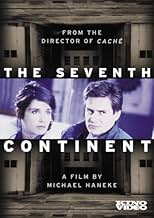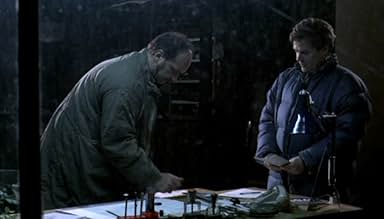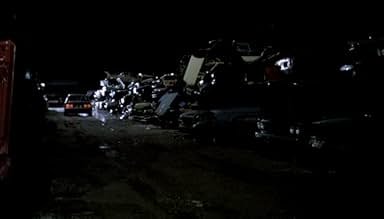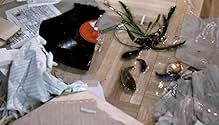AVALIAÇÃO DA IMDb
7,6/10
18 mil
SUA AVALIAÇÃO
Um planejamento de uma família europeia para fugir para a Austrália parece estar preso na sua rotina diária com incidentes menores. Contudo, por detrás da sua aparente calma, eles estão plan... Ler tudoUm planejamento de uma família europeia para fugir para a Austrália parece estar preso na sua rotina diária com incidentes menores. Contudo, por detrás da sua aparente calma, eles estão planejando algo sinistro.Um planejamento de uma família europeia para fugir para a Austrália parece estar preso na sua rotina diária com incidentes menores. Contudo, por detrás da sua aparente calma, eles estão planejando algo sinistro.
- Direção
- Roteiristas
- Artistas
- Prêmios
- 2 vitórias e 1 indicação no total
Jennifer Rush
- Self
- (cenas de arquivo)
- (não creditado)
- Direção
- Roteiristas
- Elenco e equipe completos
- Produção, bilheteria e muito mais no IMDbPro
Avaliações em destaque
From my introduction to Michael Haneke through his 1997 film, Funny Games, I knew he shared an important quality with one of my favorite filmmakers. Like David Lynch, Michael Haneke doesn't care if the audience is comfortable while watching his films. Haneke extends his scenes past the point where the audience watching thinks is necessary, creating a hypnotic trance that one is unable to look away from. This ability of Haneke's to espouse the audience's attention forces the viewer to become an active participant in his films and thrusts us into an often much-needed self-examination. Haneke's feature film debut, The Seventh Continent takes an in-depth look at the lives of a family chained by the shackles of their expected existence willing to go to extreme measures to escape the monotonous confines of their daily existence.
The long takes Haneke favors throughout The Seventh Continent, introduce the audience to a young family living in Europe that live in precisely the way that is expected of them. Georg Schober (Dieter Berner) works diligently at his career, always placing himself in the best possible position to advance through promotions and better situate himself in his profession. Anna Schober (Birgit Doll), an optometrist, steadfastly maintains her family's home, dutifully completing all the tasks and errands to keep the everyday lives of her family running. Anna is also reacting to the death of a parent, which has devastated her brother, assuming the role of the strong focused sibling taxed with the burden of maintaining her parents' business. The youngest member of the family, Evi, fills her time coloring pictures, doing her homework, and occasionally causing mischief at school by feigning blindness. Neither Georg's career advancements, Anna's mourning, nor Evi's misbehavior is consequential to the story--they are simply moments that happen in each of their lives and fills their days. This is precisely Haneke's point; most of what we do in our lives are mundane activities which fill our time until we die. Whether it be a scene filmed in real time at a car wash or listening to someone relay a story during an eye exam, Haneke gives us these moments in as similar a way as they actually occur, removing all sense of grandiose filmmaking, forcing the audience to see themselves in the lives of those depicted on screen. It's hypnotizing they way we can scoff at collective suicide, yet through watching the events that lead up to the act come to understand the universality of the expectations we adhere to. Every move is repetitive, the same food is served every day at breakfast, the same pommel horse is jumped over in gym class, the same filling station is visited when the car is low on fuel. We often live our lives thinking of the future, fooling ourselves into believing that the monotony we serve daily is crucial to our growth until we are shocked to learn that the future we have been striving towards has become the past. We get so lost in the day-to-day that we need Haneke to make clear that the way we actually live our lives doesn't make all that much sense once analyzed.
The cold emotionless state maintained in the Schober home is sobering to watch. No amount of intimacy brings the family closer together. Even after making love, Georg and Anna immediately return to the distance between each other that fills their days. Not only does one hardly see any affection between the members of the Schober family, but we also rarely see them enjoy conversations with each other. The cold, detached atmosphere isn't confined to their home, either. Each time they exchange currency for a service, the audience is afforded a glimpse into the lives of everyone they interact with, each doing their job or performing a service while all vitality seems to have been drained from their being. Through the entire runtime of The Seventh Continent, we don't see a single meaningful human connection. There is even a scene in which a man recently released from his employment with Georg, returns for his things and isn't given a single embrace of encouragement or a kind word. His appearance disrupts the work because he is unexpected, further cementing Haneke's notion that our lives are simply made up of a series of repeated actions, and we are stricken by the break from routine when interrupted. Despite the lack of compassionate connectivity, I would argue that Haneke's feature is one of the most humanistic films I have recently seen, because it gives hope to our existence and alerts us to think critically about our society.
The long takes Haneke favors throughout The Seventh Continent, introduce the audience to a young family living in Europe that live in precisely the way that is expected of them. Georg Schober (Dieter Berner) works diligently at his career, always placing himself in the best possible position to advance through promotions and better situate himself in his profession. Anna Schober (Birgit Doll), an optometrist, steadfastly maintains her family's home, dutifully completing all the tasks and errands to keep the everyday lives of her family running. Anna is also reacting to the death of a parent, which has devastated her brother, assuming the role of the strong focused sibling taxed with the burden of maintaining her parents' business. The youngest member of the family, Evi, fills her time coloring pictures, doing her homework, and occasionally causing mischief at school by feigning blindness. Neither Georg's career advancements, Anna's mourning, nor Evi's misbehavior is consequential to the story--they are simply moments that happen in each of their lives and fills their days. This is precisely Haneke's point; most of what we do in our lives are mundane activities which fill our time until we die. Whether it be a scene filmed in real time at a car wash or listening to someone relay a story during an eye exam, Haneke gives us these moments in as similar a way as they actually occur, removing all sense of grandiose filmmaking, forcing the audience to see themselves in the lives of those depicted on screen. It's hypnotizing they way we can scoff at collective suicide, yet through watching the events that lead up to the act come to understand the universality of the expectations we adhere to. Every move is repetitive, the same food is served every day at breakfast, the same pommel horse is jumped over in gym class, the same filling station is visited when the car is low on fuel. We often live our lives thinking of the future, fooling ourselves into believing that the monotony we serve daily is crucial to our growth until we are shocked to learn that the future we have been striving towards has become the past. We get so lost in the day-to-day that we need Haneke to make clear that the way we actually live our lives doesn't make all that much sense once analyzed.
The cold emotionless state maintained in the Schober home is sobering to watch. No amount of intimacy brings the family closer together. Even after making love, Georg and Anna immediately return to the distance between each other that fills their days. Not only does one hardly see any affection between the members of the Schober family, but we also rarely see them enjoy conversations with each other. The cold, detached atmosphere isn't confined to their home, either. Each time they exchange currency for a service, the audience is afforded a glimpse into the lives of everyone they interact with, each doing their job or performing a service while all vitality seems to have been drained from their being. Through the entire runtime of The Seventh Continent, we don't see a single meaningful human connection. There is even a scene in which a man recently released from his employment with Georg, returns for his things and isn't given a single embrace of encouragement or a kind word. His appearance disrupts the work because he is unexpected, further cementing Haneke's notion that our lives are simply made up of a series of repeated actions, and we are stricken by the break from routine when interrupted. Despite the lack of compassionate connectivity, I would argue that Haneke's feature is one of the most humanistic films I have recently seen, because it gives hope to our existence and alerts us to think critically about our society.
A family, starved for attention and desperate to escape their daily life of abrasive routine, decide to turn things around one year and go against the routine. The film depicts their lives in three painful years of isolation, meaningless actions, and disillusionment. The first two-thirds of the film show the loud and hectic world that they are inexplicably a part of. Everything is just a series of actions. The semi-apocalyptic sequence shows a kind of desperate forcefulness of life that never breaks though, and the claustrophobic nature comes across as frighteningly unnerving. Tarkovsky would be proud.
The Seventh Continent was the second Michael Haneke film I had seen after The Piano Teacher. While I do not think that it is as honest a film as The Piano Teacher, I do applaud the fearless dynamic of the film to be completely devoid of style and of typical film conventions in order to depict a world that grows increasingly unpredictable and harrowing. The film is very Hitchcock-like in how it slowly and quietly builds it's themes involving desolate emotions. It is a tremendously scary film, but it is scary in a way that comes off a lot stronger after the film has finished and you allow it's images to swim around in your head for a while. The loss of passion and of feeling in a human being, to my knowledge, has never been depicted in such a pessimistic way.
This is a very angry film. This is a very resentful film. This is a film that celebrates sadness and anger and I hated watching it. When the film finds time to depict humanity, it writes it off like it is useless. What makes me even more angry about the film, in a way, is how you can almost feel Haneke behind the camera feeling resentful and wanting to punish the audience for wanting to view a film with a good story and a moving and engaging plot. Haneke goes so far out of his way to provide nothing in the way of narrative power and instead opts to craft an angry and traumatizing film. What makes the film work is it's power to provide some deeply haunting imagery and some truly worthwhile substance that I couldn't help but appreciate. Two of these three characters have complete control over everything that happens and they obviously feel that what they do in the final act of the film is most beneficial. Who am I to judge their own control over their lives. What pisses me off is how simple minded they are as characters. I just feel that Haneke prefers to emphasize these problems that these characters share, and what I am bothered by was that he didn't make it less obvious.
Overall, it's not one of Haneke's best films, but for a debut theatrical picture it is about as good as one can get. What strikes me as rather unusual about this film, when compared to his other films, is how it suffers from the same major problems that pretty much all of his films have. For example, he has never been able to build any sympathy with any of his characters, at least from the films of his that I've seen, and this film is no different in that regard. The film of his that I personally think suffers the most from it is Funny Games (both versions). With his picture Cache, it only became a problem early on in the film, and in Benny's Video and Hour of the Wolf it helped add to the atmosphere while damaging the humanity of the films in question. I think that The Seventh Continent shows plenty of promise with Haneke and is extremely riveting at times, but it's easily the absolute worst place to start if you are interested in getting into his films. It will not leave you with a good impression of his work, and only after watching Funny Games and Cache (his most easily accessible films in my opinion) will you be able to catch his reoccurring themes.
The Seventh Continent was the second Michael Haneke film I had seen after The Piano Teacher. While I do not think that it is as honest a film as The Piano Teacher, I do applaud the fearless dynamic of the film to be completely devoid of style and of typical film conventions in order to depict a world that grows increasingly unpredictable and harrowing. The film is very Hitchcock-like in how it slowly and quietly builds it's themes involving desolate emotions. It is a tremendously scary film, but it is scary in a way that comes off a lot stronger after the film has finished and you allow it's images to swim around in your head for a while. The loss of passion and of feeling in a human being, to my knowledge, has never been depicted in such a pessimistic way.
This is a very angry film. This is a very resentful film. This is a film that celebrates sadness and anger and I hated watching it. When the film finds time to depict humanity, it writes it off like it is useless. What makes me even more angry about the film, in a way, is how you can almost feel Haneke behind the camera feeling resentful and wanting to punish the audience for wanting to view a film with a good story and a moving and engaging plot. Haneke goes so far out of his way to provide nothing in the way of narrative power and instead opts to craft an angry and traumatizing film. What makes the film work is it's power to provide some deeply haunting imagery and some truly worthwhile substance that I couldn't help but appreciate. Two of these three characters have complete control over everything that happens and they obviously feel that what they do in the final act of the film is most beneficial. Who am I to judge their own control over their lives. What pisses me off is how simple minded they are as characters. I just feel that Haneke prefers to emphasize these problems that these characters share, and what I am bothered by was that he didn't make it less obvious.
Overall, it's not one of Haneke's best films, but for a debut theatrical picture it is about as good as one can get. What strikes me as rather unusual about this film, when compared to his other films, is how it suffers from the same major problems that pretty much all of his films have. For example, he has never been able to build any sympathy with any of his characters, at least from the films of his that I've seen, and this film is no different in that regard. The film of his that I personally think suffers the most from it is Funny Games (both versions). With his picture Cache, it only became a problem early on in the film, and in Benny's Video and Hour of the Wolf it helped add to the atmosphere while damaging the humanity of the films in question. I think that The Seventh Continent shows plenty of promise with Haneke and is extremely riveting at times, but it's easily the absolute worst place to start if you are interested in getting into his films. It will not leave you with a good impression of his work, and only after watching Funny Games and Cache (his most easily accessible films in my opinion) will you be able to catch his reoccurring themes.
Having spent a couple years now browsing thru IMDb, this is the first film I've seen that actually motivated me to leave a comment. I've seen 3 other (more recent) movies by Haneke: "Funny Games," "Code Unknown," and "The Piano Teacher." All of them disturbed me in their own special way--a feeling that I obviously don't mind getting from a film. "The 7th Continent," though, really blew me away in ways that I find difficult but necessary to describe.
This was Haneke's first theatrical film & apparently based on a true story--although I'm always skeptical of such disclaimers (the same was said about "Picnic at Hanging Rock," another great creepy film). It's divided into 3 parts: 1987, 1988, and 1989. Many scenes repeat themselves, and we get a clear sense that the family (dad, mom, daughter) is going through the motions of modern life. The banalities have a bizarre and uneasy edge to them, though, that really piles up by the time Part 3 arrives. All I have to say about the last 40 minutes is: OH MY GOD! I thought Gaspar Noe's "I Can't Sleep" (?) had an excruciating buildup, but that one (with all its explicitness) can't hold a candle to the amount of emotional and physical devastation packed into the conclusion of "Continent."
Fans of Haneke's later work should definitely check this one out to see the origin of his trademarks: no music score, seemingly pointless scenes that linger (often with little or no dialogue), off-putting camera angles (we sometimes see only the actors' hands or feet). While these techniques aren't always successful in his films ("Code" had some interminable moments), they all come together seamlessly in "Continent." A superb work!
This was Haneke's first theatrical film & apparently based on a true story--although I'm always skeptical of such disclaimers (the same was said about "Picnic at Hanging Rock," another great creepy film). It's divided into 3 parts: 1987, 1988, and 1989. Many scenes repeat themselves, and we get a clear sense that the family (dad, mom, daughter) is going through the motions of modern life. The banalities have a bizarre and uneasy edge to them, though, that really piles up by the time Part 3 arrives. All I have to say about the last 40 minutes is: OH MY GOD! I thought Gaspar Noe's "I Can't Sleep" (?) had an excruciating buildup, but that one (with all its explicitness) can't hold a candle to the amount of emotional and physical devastation packed into the conclusion of "Continent."
Fans of Haneke's later work should definitely check this one out to see the origin of his trademarks: no music score, seemingly pointless scenes that linger (often with little or no dialogue), off-putting camera angles (we sometimes see only the actors' hands or feet). While these techniques aren't always successful in his films ("Code" had some interminable moments), they all come together seamlessly in "Continent." A superb work!
A powerful, disturbing film, shot in a highly idiosyncratic style. Michael Haneke's dissection of Austrian alienation is astonishingly effective. The style is, for the first part of the film, full of such close-ups that we don't see the characters' faces for nearly half an hour, but we share with them their view of the breakfast cereals, shoes and shopping. It should be boring, but is instead gripping, a quiet build-up to the prosaic horrors to come.
It is hard to comment without revealing some of these horrors, but the overall effect is shattering, tolerable only because Haneke avoids any real involvement with the characters and their motivations. With hindsight this is a weakness, and I reached the end of the film with the feeling 'what was that all about?'. But it is a film to reflect on, unlike any other that I have seen. Don't miss it - unless you are feeling depressed!
It is hard to comment without revealing some of these horrors, but the overall effect is shattering, tolerable only because Haneke avoids any real involvement with the characters and their motivations. With hindsight this is a weakness, and I reached the end of the film with the feeling 'what was that all about?'. But it is a film to reflect on, unlike any other that I have seen. Don't miss it - unless you are feeling depressed!
Der Siebent Kontinent is a film you should watch. It is not pleasant neither does Michael Haneke uses any tricks in order to even interest you about the characters or their lives. Yet, it is as powerful as an atomic bomb during peace time. It is LOUD and its message (which is whatever you want it to be) is right in your face.
It is amazing how a masterpiece needs no soundtrack, fancy camera work or explicit and extended dialogs.
Unfortunately, it is very hard to find. The screenings are rare and no personal editions on VHS or DVD exist as far as I am aware. Many will recognize the "Piano Teacher" approach to directing but, this is as powerful as it can get. One of the finest examples of style not overlapping form.
Treat yourself with this lesson. Watch it if you can. Specially if you experienced depression at a given time in your life.
It is amazing how a masterpiece needs no soundtrack, fancy camera work or explicit and extended dialogs.
Unfortunately, it is very hard to find. The screenings are rare and no personal editions on VHS or DVD exist as far as I am aware. Many will recognize the "Piano Teacher" approach to directing but, this is as powerful as it can get. One of the finest examples of style not overlapping form.
Treat yourself with this lesson. Watch it if you can. Specially if you experienced depression at a given time in your life.
Você sabia?
- CuriosidadesBased on real events.
- Citações
Georg Schober: We have to cancel the newspaper subscription
Anna Schober: Mhm
- ConexõesFeatured in Selección TCM: Michael Haneke (2012)
- Trilhas sonorasSend Me Roses
(uncredited)
Written by Günter Mokesch and Karin Raab
Performed by Günter Mokesch and Karin Raab
Principais escolhas
Faça login para avaliar e ver a lista de recomendações personalizadas
- How long is The Seventh Continent?Fornecido pela Alexa
Detalhes
Bilheteria
- Faturamento bruto mundial
- US$ 428
Contribua para esta página
Sugerir uma alteração ou adicionar conteúdo ausente


























